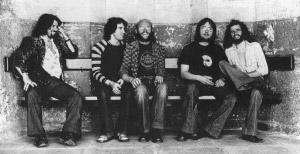Woe to the musician who can actually play his or her instrument. In that direction ridicule lies. Ridicule by reason of excessively long solos, of leaden grooves, of unpleasant facial posturing so as to simulate profundity.
In this regard: consider the plight of Gentle Giant. They are among the most reviled of prog-rock outfits from the ’70s. They made concept albums; they were heavily influenced (or so it was said) by the French Renaissance writer Rabelais; they were all capable of playing recorders; and, after the advent of punk, they tried to sell out and make New Wave albums. If all that were not bad enough, they started life as a soul band (Simon Dupree and the Big Sound), electing to go prog in 1969.
It would seem impossible to defend Gentle Giant, and yet that is what I mean to do. My defense rests on the following notions: 1) That 4/4 time is really boring and starts to hurt your head after a while. 2) That counterpoint, as a compositional tool, is beguiling and satisfying to the ears. 3) That a record with a lot of different instrumental textures is more consistently interesting than one on which every song has the very same instrumentation. 4) That dynamic variation is the secret to making a recording move over its course (if all of the songs start and end at the same level, there’s no reason to begin at the beginning of an album and go all the way to the end). 5) That love ditties, lyrically speaking, need not feature mere teen platitudes.
Free Hand, Gentle Giant’s album from 1975, is a fine example of these enumerated points, and a good place to start for those people who have not yet given up reading these lines. It starts, shockingly, with a slightly funky number called “Just the Same,” which, despite my own revilement of Gentle Giant in 1976 (when I first heard them), I kind of liked anyhow. The snapping that opens the track changes time signatures after four bars, which is clever, and then the modified soul riff that sustains the song begins, featuring the surprising and only slightly show-offy keyboards of Kerry Minnear, these finding a common cause with Gary Green’s guitars in a way that is both inventive and satisfying. As with many of the lyrics on the album, which are not about Rabelais, “Just the Same” seems, in repeated attempts, to assert the quotidian aspects of its protagonist’s daily life in the face of romantic disenchantment, while at the same time breaking down preconceptions as to the exalted status of the ’70s rock-and-roll musician.
While the book on Gentle Giant was that they were such virtuosos they didn’t bother to feel what they were doing, I defy the sensitive listener not to feel a little moved by Minnear’s elegiac recollecting of a relationship past (it’s a theme!) in “On Reflection.” The title track, too, evokes another lost love (and music biz) allegory, which—in addition to being faultlessly played and beginning with some Genesis-esque classical noodling—effectively reprises the off-handed gospel funk affinities of “Just the Same.”
After “Just the Same,” Free Hand moves into some classic Gentle Giant juxtapositions of very baroque counterpoint writing with angular and aggressive prog passages. There are enough tricky time signatures in each song to exhaust the entire “Fuck Art, Let’s Dance” crowd within a song or two. Passages played on vibraphone (yes, real vibraphone) and recorder give way to heavily electrified wah-wahing by Green. Singer Derek Shulman’s warm but slightly nasal voice alternates with Kerry Minnear’s choirboy tenor.
And so forth. Yes, if you hate the whole idea of prog and have managed to ignore the current vogue for bands that are not entirely ignorant of the idiom—the Mars Volta, Mastodon, Battles, et al.—you will likely not be convinced by this recording. But if you are finding that the relentless drum machinery of contemporary bubblegum and the tedious samples of hip-hop are not enough, try dipping into something more fanciful from the era when kind of being able to play your instrument was something you did not need to hide.
—Rick Moody





